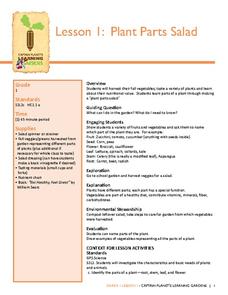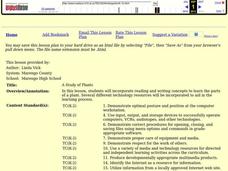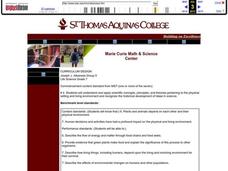Captain Planet Foundation
Plant Parts Salad
How are vegetables beneficial to a healthy diet? Have kids examine different types of vegetables, such as zucchini, broccoli, and carrots, and determine which parts of the plant they represent. Then, they taste the vegetables as a...
Curated OER
A Study of Plants
Using a variety of multi-media resources, your high schoolers become familiar with the parts of plant and create a story about plants using vocabulary learned during their research of plants. Completed stories are published using the...
Core Knowledge Foundation
Plants Tell It Again!™ Read-Aloud Anthology
A 190-page anthology explores the life and parts of plants, flowers, and trees while boosting reading comprehension skills. Literature and informational texts showcase Johnny Appleseed and George Washington Carver. Lessons...
Baylor College
Needs of Plants
What better way to learn about plant life than by creating a class garden? Young botanists start with a brief discussion about radishes before planting seeds and watching them grow. To determine the importance of water,...
PreKinders
Parts of a Tree
Don't bark up the wrong tree with this set of cards! Seven cards present different parts of a tree, including a trunk, branches, and leaves. A great addition to your science or language arts lesson.
Curated OER
Learning About Plants- Flowers for a Special Occasion
Students explore the parts of plants and discover that plants need to grow. In this plant lesson, students discuss the parts of the plant and plant petunias. Students can share their plants with friends or families.
Baylor College
Do Plants Need Light?
Turn your classroom into a greenhouse with a lesson on plant growth. First, investigate the different parts of seeds, identifying the seed coat, cotyledon, and embryo. Then plant the seeds and watch them grow! Measure the new plants...
Garden Earth Naturalist Club
Parts of a Flower! Flower Dissection
Sometimes the best way to learn about plants is to see the different parts of a plant yourself. Groups of learners dissect flowers to answer questions about what they observe and what they wonder about their flower.
Curated OER
Parts of a Plant
First graders discover the parts of a plant. In this science lesson, 1st graders identify and label the parts of a plant and record their findings on a word processor.
Curated OER
How Plants Spice Up Our Lives
Third graders study plants. In this biology lesson plan, 3rd graders label and identify parts of plants, identify spices obtained from plants, and determine what part of a plant a spice comes from by using taste, touch, smell and sight.
Curated OER
Drawing Plants with Plant Studio Freeware
Students identify parts of plants by name and the relationship among these parts as they use Plant Studio Freeware Wizard and tools on the computer to draw a particular plant from life or from a picture.
Curated OER
Identify parts of a plant
In this science based worksheet, students utilize a book about plants to draw a picture of a plant and identify as many parts of the plant as they can. Students also label each part of the plant of their choice.
Curated OER
Benefits of Indoor Plants
Young scholars diagram a plant. In this Science lesson plan, students explore the concept of photosynthesis focusing on the oxygen production. Young scholars calculate the amount of plants needed to filter the air in their classroom.
Curated OER
Eating Plants
Students identify parts of a plant. In this life science activity, student groups locate the leaves and fruits on vegetables, then find the roots. Lesson includes extension activities and background teacher information.
Curated OER
Plant Parts
Little ones identify the parts of a plant and practice following directions at the same time. They color each part of the flowering plant the color indicated on the sheet. Roots are brown, leaves are green, the flower is red, and the...
Curated OER
Six Plant Parts
Students create a harvest burrito out of fruit, flowers, roots, stems, and more. In this plants lesson plan, students go out into the garden and identify the 6 plant parts.
Curated OER
To Eat or Not to Eat?
Students identify various parts of plants and determine which parts people eat. They conduct a celery stalk experiment in which they determine the value and use of the stem, and how it helps the plant to meet its needs. Students use a...
Curated OER
Plants and Animals
Students find common needs between plants and animals. In this plants and animals lesson students compare that both plants and animals need food and water. They also find the differences between plant and animal needs.
Curated OER
Edible and Medicinal Plants: Field Trip Guide
Though it's designed to guide a field trip to the New York Botanical Garden, you could take resource like this one to a local park, wilderness area, school garden, or even a weedy empty lot. Middle schoolers identify plant parts and...
Curated OER
What Parts of a Plant Do We Eat?
Did you know that tomtoes and cucumbers are actually fruits? Biology or botany beginners read about the function of flowers and fruit and find that some food items commonly called vegetables are, by definition, also fruits! Give learners...
Curated OER
Meet the Plants
Are you looking for a PowerPoint that identifies and explains the job each plant part performs? Perhaps you've found it! Examples of different types of plants, as well as common household items derived from plants are included. The text...
Curated OER
Plants and Animals
Seventh graders discover the interconnectedness of plants and animals in ecosystems. In groups, they create a food web and discuss the problems when one link of the chain is broken. To end the lesson, they set up a balanced environment...
Berkshire Museum
The Three Life-Giving Sisters: Plant Cultivation and Mohican Innovation
Children gain first-hand experience with Native American agriculture while investigating the life cycle of plants with this engaging experiment. Focusing on what the natives called the Three Sisters - corn, beans, and squash - young...
Baylor College
What's Is Soil Made Of?
It's time to roll up those sleeves and get a little dirty in the second instructional activity of this series on the science of food. Investigate where plants and animals get the minerals they need to live in this two-part exploration of...

























